Key takeaways:
- Customer experience conferences facilitate insightful sharing and networking, enhancing understanding of customer needs.
- Personalized follow-ups after events significantly strengthen connections and foster future collaborations.
- Engaging attendees through tailored discussions and interactive tools boosts participation and creates deeper relationships.
- Sharing personal stories and insights during conversations fosters trust and collaboration among peers.
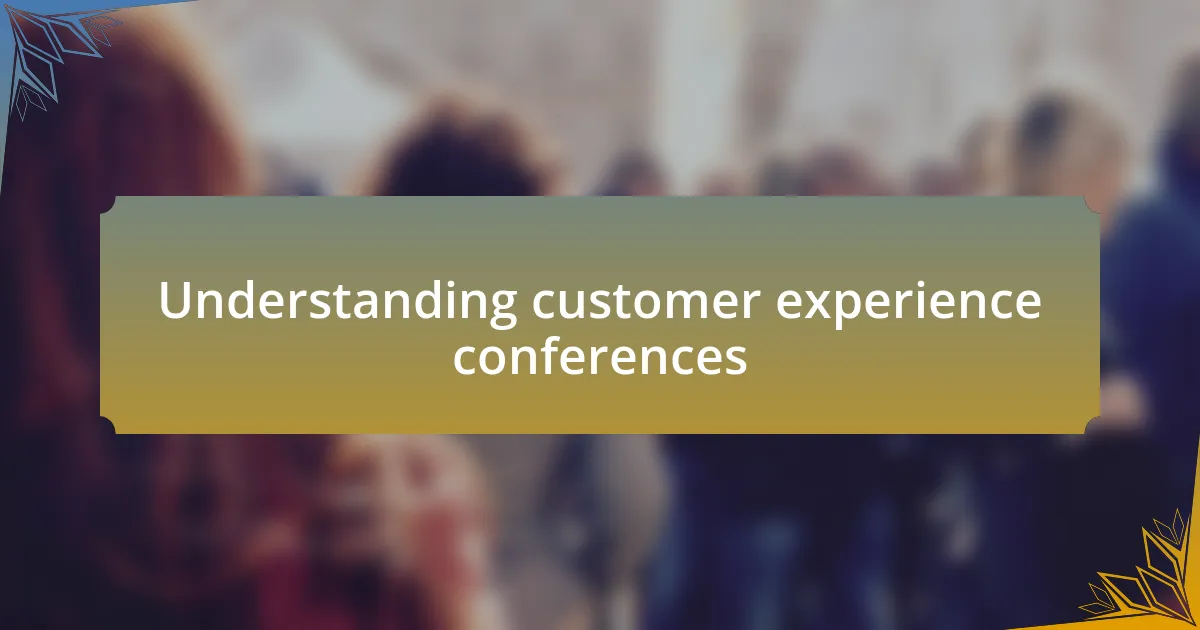
Understanding customer experience conferences
Customer experience conferences serve as dynamic platforms where professionals come together to share insights and best practices that elevate customer interactions. I remember my first experience at one of these events; the energy in the room was contagious. It felt like everyone was genuinely invested in improving their understanding of customers and their needs. Have you ever felt that buzz when surrounded by like-minded individuals? It’s invigorating.
These conferences typically feature a range of sessions, from keynotes by industry leaders to interactive workshops, allowing attendees to dive deep into various facets of customer engagement. I found that participating in a workshop where we role-played customer scenarios created an emotional connection to the material. It wasn’t just theoretical; it brought the challenges to life. How often do we get the chance to step into our customers’ shoes like that?
Moreover, the networking opportunities at these conferences can be invaluable. I once struck up a conversation during a coffee break that led to a collaborative project with another attendee. It made me realize that the relationships formed here can extend well beyond the event itself. Have you considered how a single connection could change your business approach? This is where the true value lies, and it’s often these moments that define one’s experience at a customer experience conference.
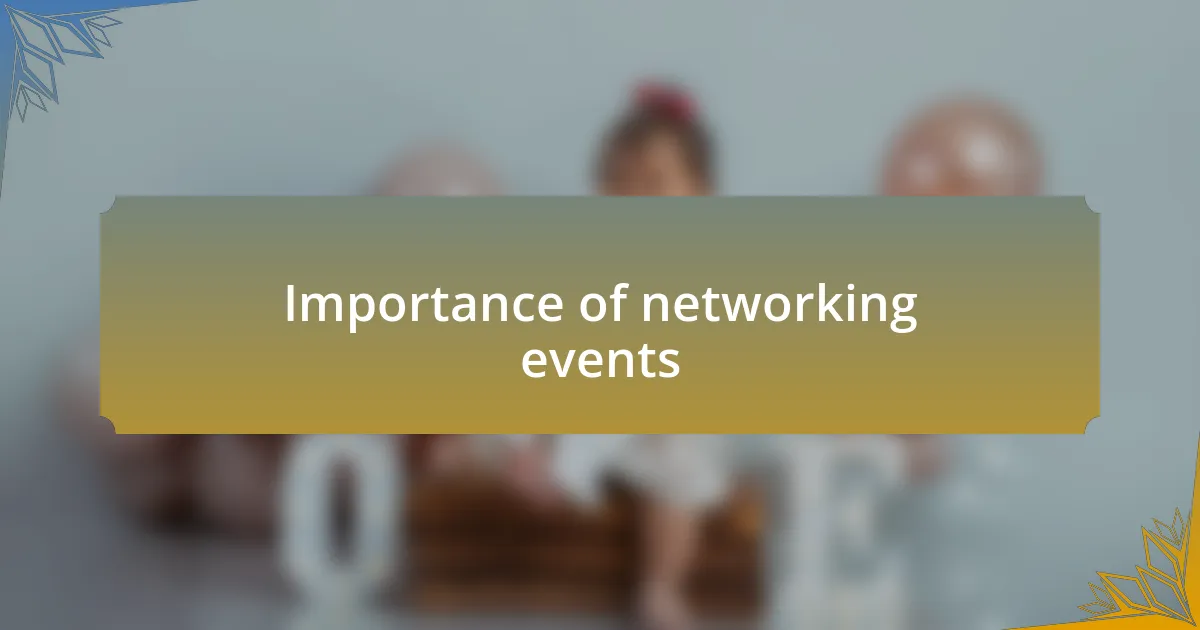
Importance of networking events
Networking events are essential because they offer a unique chance to forge meaningful connections that can lead to collaborative opportunities. I remember attending an event where a speaker’s insight sparked my curiosity, leading me to approach them afterward. That simple interaction blossomed into an exciting mentorship that profoundly impacted my career trajectory. Have you ever wondered how one conversation might alter your professional path?
The atmosphere at networking events is often electric, filled with shared goals and aspirations among attendees. I vividly recall the moment I found myself in a group discussion about innovative customer retention strategies. The conversations flowed organically, allowing different perspectives to illuminate potential solutions I hadn’t considered before. Have you ever been in a situation where the collective knowledge of a group opened new doors for you?
More than just exchanging business cards, these gatherings are about building relationships that nurture personal growth and professional success. When I connected with fellow attendees, I saw firsthand how open dialogues can lead to lasting partnerships and fresh ideas. Isn’t it fascinating to think that each encounter has the potential to shape your future in unexpected ways?
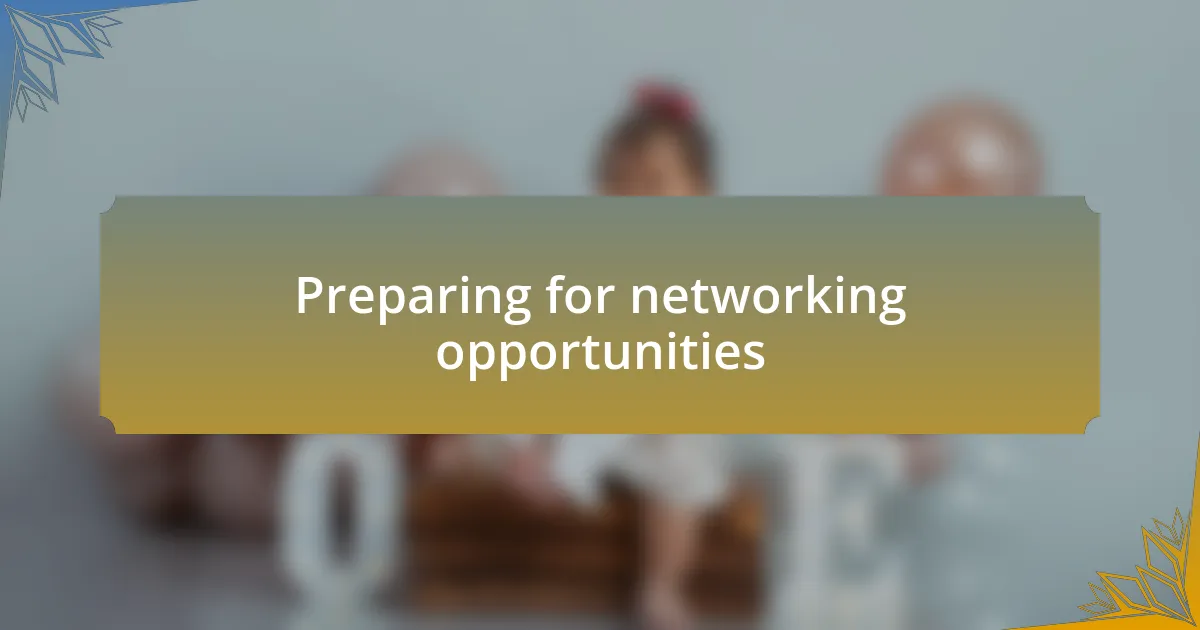
Preparing for networking opportunities
Being prepared for networking opportunities means knowing what you want to achieve before stepping into an event. I always take time to outline my goals. For instance, at one conference, I aimed to meet specific industry leaders and ended up with valuable insights that helped refine my approach to customer experience. Have you ever considered how clarity in intentions can shape your interactions?
Understanding your audience can also enhance your networking strategy. I recall a situation where I engaged with a fellow attendee who worked in a completely different industry but had valuable insights on customer engagement. By adapting my conversation to connect our different experiences, I gained a fresh perspective that I hadn’t anticipated. Isn’t it intriguing how diverse backgrounds can spark innovative ideas?
Lastly, preparing a few conversation starters can break the ice and ease the initial awkwardness of networking. I always think of a unique question or a recent industry trend to discuss. This approach helped me during a particularly large event, where I met someone who later became a collaborator on a significant project. What if you could turn an initial chat into a long-term partnership simply by being prepared?
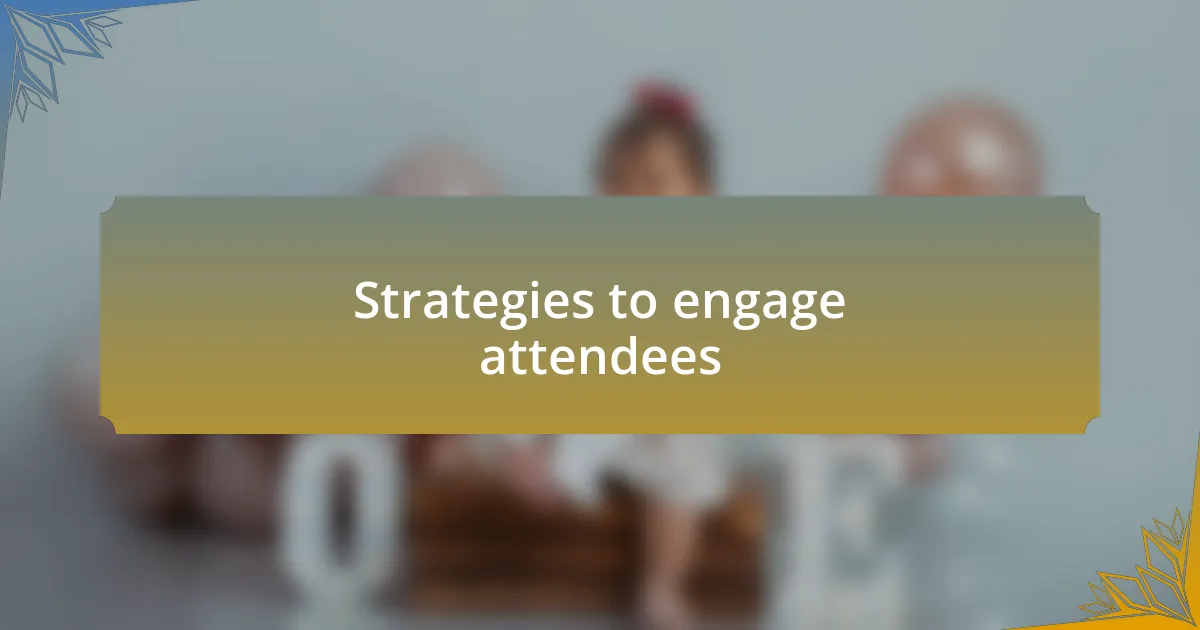
Strategies to engage attendees
Finding ways to engage attendees at networking events often involves targeting your approach to their interests. I remember a specific event where I initiated roundtable discussions on common challenges people faced in customer experience. By framing the dialogue around their needs, I noticed the intensity of participation shot up. It made me realize how tailored conversations can lead to deeper connections. Have you ever found that people light up when the discussion revolves around their passions?
Another effective strategy is using interactive tools to enhance engagement. One time, I introduced a live poll during a session. Watching attendees share their preferences in real-time not only sparked conversations but also made them feel involved in shaping the discussion. It was thrilling to see how much enthusiasm this simple tactic generated. Shouldn’t we leverage technology to make networking more dynamic and inclusive?
Lastly, I believe follow-up is crucial in maintaining the momentum created at events. After a conference, I took the time to connect with several people on LinkedIn, mentioning specific topics we discussed. This personal touch not only helped to solidify our connection but also opened doors for future collaborations. How do you keep the conversation going once the event is over? The effort invested in follow-ups can transform fleeting encounters into lasting relationships.
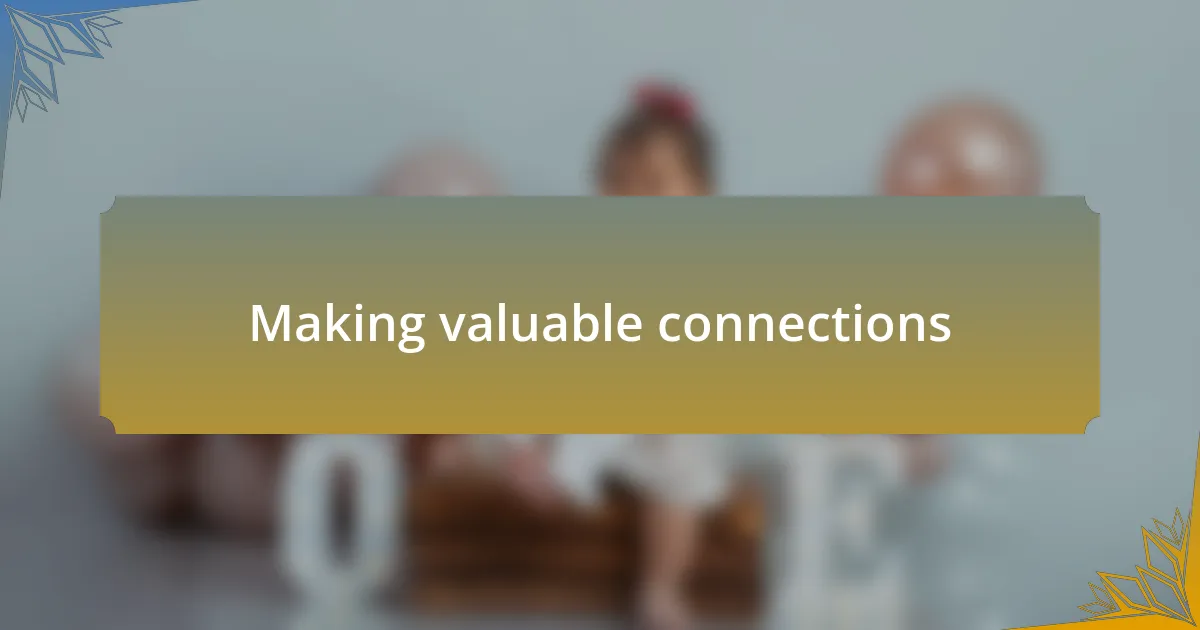
Making valuable connections
Making valuable connections requires a shift in mindset from merely collecting business cards to genuinely engaging with individuals. I remember a time when I met a fellow attendee at a conference who shared an unexpected insight about customer loyalty. Instead of a surface-level chat, we dove deep into our experiences, which revealed common interests and challenges we weren’t even aware we had. Don’t you find that conversations that delve into real issues often yield the most rewarding connections?
Sharing personal stories can be a powerful tool to forge deeper relationships. I once recounted my journey through a challenging project during a networking break, which prompted others to open up about their own struggles. It was almost as if a veil lifted, and in that moment, we transitioned from strangers to colleagues who truly understood one another. Isn’t it fascinating how vulnerability can create such a strong bond?
In exploring the dynamics of networking, I’ve learned that listening is just as important as speaking. At a recent event, a quiet participant shared insights that resonated deeply with the group. By giving her space to express her thoughts, our conversation turned into a rich dialogue instead of a one-sided exchange. Have you experienced the power of attentively listening to someone? It amplifies the connection and makes others feel valued and seen.
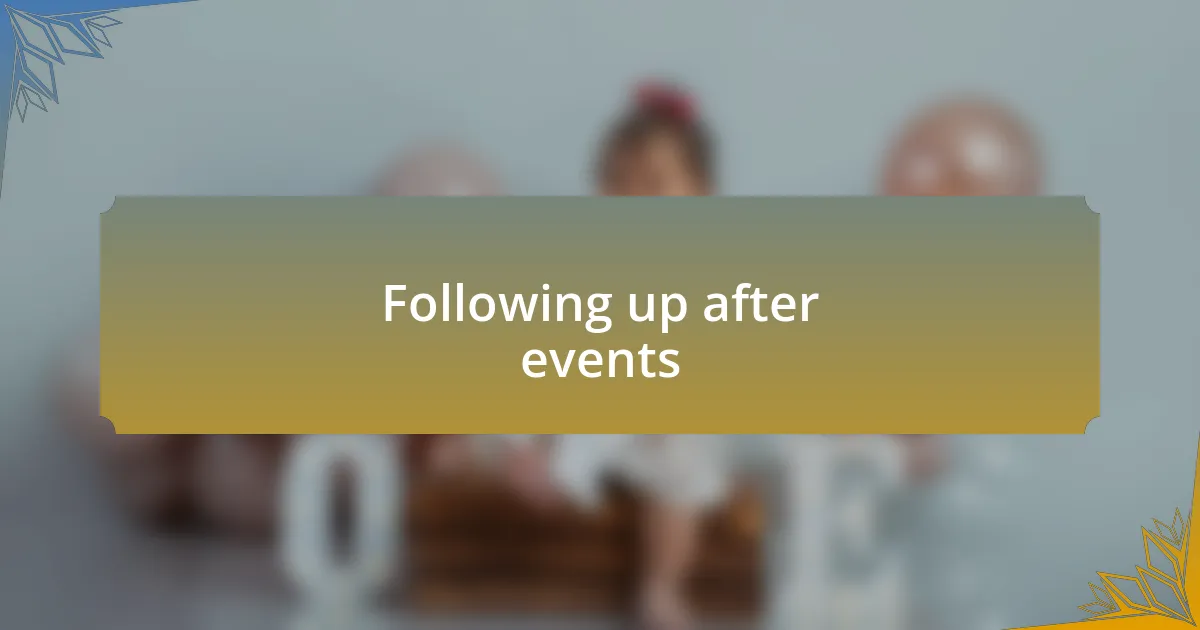
Following up after events
Following up after an event is where the real magic happens in maintaining connections. After a recent conference, I made it a point to email the individuals I had meaningful conversations with, sharing a relevant article I thought they’d find interesting. It was rewarding to see how quickly my messages sparked new discussions, proving that the effort to follow up pays off in reinforcing those initial connections. Have you ever noticed how a simple message can reignite a conversation?
I’ve also found that personalizing my follow-ups significantly enhances the interaction. Instead of sending a generic “Great to meet you” message, I reference specific topics we discussed. One time, I remembered a contact’s unique approach to customer feedback that intrigued me, and mentioning it in my follow-up not only made it more memorable but also prompted a thoughtful response. Doesn’t it feel amazing to be remembered for your ideas?
Moreover, I believe that timing is crucial in follow-ups. Shortly after a recent networking event, I prioritised reaching out within a week while the connections were still fresh. This urgency showed my commitment to fostering those relationships. Have you ever thought about how promptness can impact your networking success? From my experience, it definitely sets the stage for a stronger rapport and future collaboration.
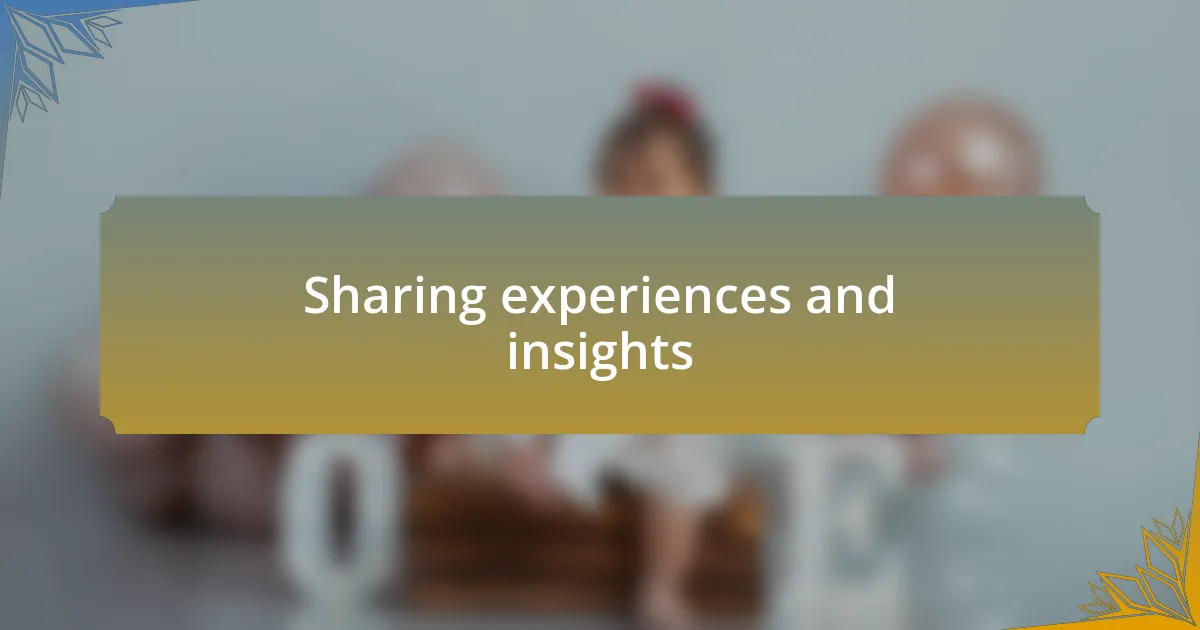
Sharing experiences and insights
Sharing experiences and insights is an invaluable part of networking events. I remember attending a session where a speaker shared their journey through customer experience challenges. Listening to their candid account struck a chord with me, as it reminded me of some hurdles I had faced in my own career. Have you ever felt that connection when someone’s story resonates so deeply with your own?
When I make the effort to share my insights, I often find it leads to richer conversations. For instance, during a breakout discussion, I recounted a strategy that boosted customer engagement at my company. The way my peers responded sparked an unexpected dialogue, and together we bounced around several innovative ideas. Isn’t it fascinating how sharing one experience can open the door to a treasure trove of insights?
I’ve realized that vulnerability can be a powerful tool in networking. Once, I shared a failure I experienced while launching a new service. Instead of shying away from it, I framed it as a learning opportunity, and the response was both encouraging and enlightening. Have you noticed how being open about our challenges fosters deeper connections? It seems that sharing not only builds trust but also creates a collaborative spirit among peers, allowing us all to grow together.